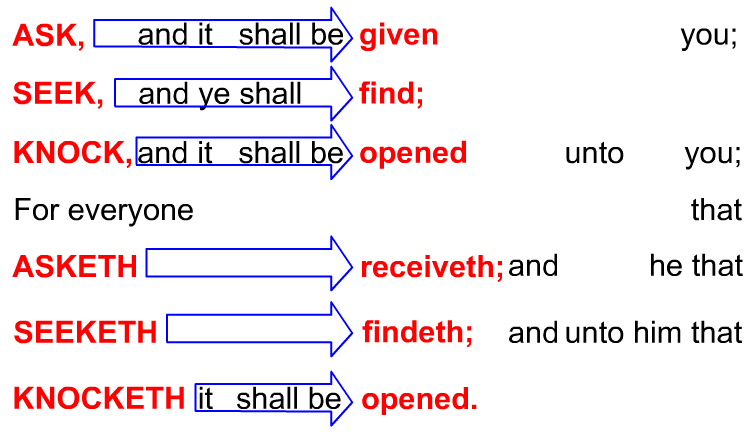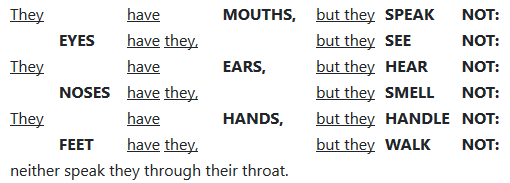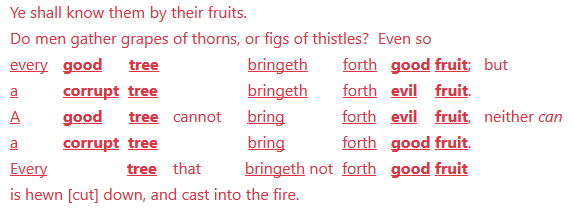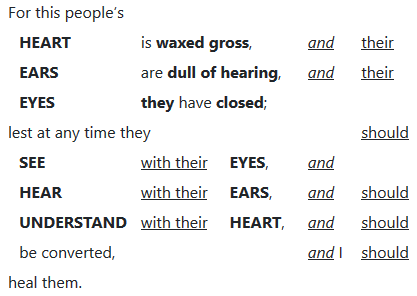Look for a Logical Flow or a Logical Result
Since you have already learned how to identify key words/phrases and similarities/differences, this technique uses steps from the previous two techniques as well as an additional step to determine if there is a logical flow or a logical result.
Cross References: See previous sections, for review, if needed:
Procedures for identifying a logical flow or a logical result:
- Identify key words or key phrases.
- Determine if there are any similarities or differences.
- Attempt to glean (collected bit by bit) a logical flow or a logical result from these key words or key phrases.
Follow this simple guideline to determine if a passage has a logical flow or a logical result: Just as the natural result of an apple tree is to yield apples, the logical flow or logical result of a specific word is the natural outcome of that particular word. For example:
- The logical result of ASKING is being given or receiving something.
- The logical result of SEEKING is finding something.
- The logical result of KNOCKING is something (e.g., a door) being opened.
The following verses demonstrate this technique:
MATTHEW 7:7-8
or LUKE 11:9-10

Once you identify that a verse(s) has a logical flow or shows a logical result, you can easily derive the remainder of the verse(s), by merely knowing the primary key words or phrases (ASK, SEEK, and KNOCK, in this case) and thinking of their logical results (given/receive, find, and opened, respectively) which are the secondary key words or phrases.
Animated Demo
The following exercise demonstrates the effectiveness of this technique:
- Attempt to recall the entire list below after slowly reading it ONCE:
- Shoes, Hat, Hands, Legs, Gloves, Shirt, Head, Back, Pants, and Feet
- Now, attempt to recall this same list after slowly reading it ONCE:
- Hat, Head, Shirt, Back, Gloves, Hands, Pants, Legs, Shoes, and Feet
For most people, the second list is easier to remember because there are a logical connection and a logical flow between the word pairs:
- A hat goes on a head; a shirt goes on a back; gloves go on the hands, and so on.
- Since there is a logical flow from the top of the head to the feet, you can logically reason the ones you may have missed as you progress through the list, even if you did not see a pattern initially.
If you did not detect the logical flow in the second list, after seeing the logical pattern, the second list becomes easy to remember even though the first list has the same items in it.
NOTE ON TRANSLATION:
While many Christians don’t like the older King James Version (KJV) of the Bible, it does highlight a feature that is not obvious in most other versions. It is the use of “eth” to denote the continuous tense. The continuous tense basically means that something is currently ongoing. For example:
- “asketh” means continuously asking
- “seeketh” means continuously seeking
- “knocketh” means continuously knocking
- “receiveth” means continuously receiving
- “findeth” means continuously finding
Knowing this fact gives greater insight into the meaning to Matthew 7:8, Luke 11:10, and many other verses in the KJV of the Bible.
Let's look at another verse that deals with the logical result of knocking in a similar example:
REVELATION 3:20
Behold, I stand at the door, and knock: if any man hear my voice, and open the door, I will come in to him, and will sup with him, and he with me.
Notice the logical progression in the above verse:
- The logical result of Jesus knocking at the door and someone hearing his voice is the door being opened.
- The logical result of the door being opened is Jesus coming in.
- The logical result of Jesus coming in is to sup with him.
- The logical result of him supping with Jesus is Jesus supping with him.
The last two phrases are not as apparent as the first two phrases are; however, once you learn these phrases, they become natural to you.
TIP: Look for Distinct Differences
Notice in the previous verse Jesus did not come into his house but rather into him. The key is to look for unique difference(s) within a verse. This technique will jar your memory the next time you quote the verse because you will become conscious of the unique difference(s). For example, most Christians misquote 2 Corinthians 4:4 by saying, “...the god of this world hath blinded the eyes of them which believe not...” When in reality, the Bible says, “...blinded the minds...” (not eyes). Noticing this unusual difference when you are learning this verse will trigger an “auto-correcting feature” in your mind the next time you quote it.
MATTHEW 4:23

Jesus WENT TEACHING, PREACHING, and HEALING. Examine the logical flow:
- A logical place to TEACH is in a synagogue (or church).
- A logical thing to PREACH is the gospel.
- Logical things to HEAL are sickness and disease.
To obtain a logical flow from the previous verse correctly, you have to think in a spiritual sense. For example, if you are asked, “Where is a logical place to teach?”, you may readily think of a school rather than of a synagogue or church. However, if you are asked, “From a Christian standpoint, where is a logical place to teach?”, you are more inclined to say a church or synagogue rather than a school.
Notice the two phrases "of the kingdom" and "among the people." Remember from the section Look for Key Words or Key Phrases that these phrases are descriptors. They illustrate or give additional meaning to the primary key words or phrases:
- What kind of gospel did Jesus PREACH? the gospel of the kingdom
- Where did Jesus HEAL all manner of sickness and disease? among the people
Cross Reference: See “Look for Key Words or Phrases” earlier in this app for details on descriptors.
Hence, you can quickly learn this scripture by merely knowing that Jesus TAUGHT, PREACHED, and HEALED and thinking of the logical results (places/things) of these actions.
Below are some additional examples:

To help you remember this passage, notice that the primary key words refer to four of the five senses (SEE, HEAR, SMELL, and HANDLE [TOUCH]). Then, think of the logical results of these senses:
- You SEE with your EYES
- You HEAR with your EARS
- You SMELL with your NOSE
- You TOUCH [HANDLE] with your HANDS
Note also how "They have" and "have they." alternate between rows and "NOT:" repeats on each row.
TIP: Forecast Before You Broadcast
To assist you in remembering the logical flow or logical result of the passage of verses, predict what the verses will say before you finish reading them. For example:
- If you are told that every good tree brings forth good fruit.
What would you predict every corrupt tree will bring forth using the logical technique mentioned in this section? You immediately think of corrupt fruit. The Bible actually says evil fruit, but your answer is sufficient to get started.
- Then, if you are told that a good tree cannot bring forth evil fruit.
What would you predict a corrupt tree cannot bring forth using the logical technique again? You guessed it: good fruit.
Look at the entire scripture passage below to enhance this point. While you read it, predict the upcoming phrases:
MATTHEW 7:16-19

You will learn later in the section on Look for Contrast or Comparison, how simple words like but and neither in the verses above are used to show contrast or comparison BETWEEN multiple verses to make them easier to remember.
Hence, predicting what verses will say can be a tremendous aid to you.

Notice the logical flow:
First part: What would block or limit the functionality of these: HEART, EARS, or EYES?
- wax gross (calloused)
- dull of hearing
- eye closed
Second part: What are the functions of these items?
- You see with what? Your EYES
- You hear with what? Your EARS
- You understand with what? Your HEART (or MIND)
While the verse below was used in the "Look for Key Words or Key Phrases" section to identify key words/phrases, the emphasis is placed on the logical flow of logical result of this passage in this section.
Acts 28:27 says basically the SAME thing as Matthew 13:15 with a few minor differences highlighted in bold below:
Acts 28:27
For the heart of this people is waxed gross,
and their ears are dull of hearing,
and their eyes have they closed;
lest they should
see with their eyes, and
hear with their ears, and
understand with their heart, and
should be converted, and I should heal them.
Matthew 13:15
For this people's heart is waxed gross,
and their ears are dull of hearing,
and their eyes they have closed;
lest at any time they should
see with their eyes, and
hear with their ears, and
should understand with their heart, and
should be converted, and I should heal them.

